Norman Crowley is one of the more interesting characters you will come across in Irish business. A native of Clonakilty in Co Cork, Crowley undoubtedly sees himself as a force for change. He’s strongwilled, deeply passionate about effective climate action, has little time for “Green socialism” and he approaches everything with a “just get it done” attitude.
The son of a farmer, Crowley describes himself as a “serial entrepreneur” having started, developed and sold businesses all throughout his career. These include a gaming software business, which he sold for €500m in 2008 and a computer business, which he sold in 1999 just before the bursting of the dot-com bubble.
But for the last decade, Crowley has dedicated his energy to meeting the climate challenge head on and plans to make a lot of money while doing it.
In 2010, he founded the company Crowley Carbon, which helps businesses to slash their carbon footprint by improving the energy efficiency of large processing plants, supply chains and offices. The company is growing rapidly. Turnover in the business is doubling every year and will reach €100m for 2020. In 2021, Crowley is forecasting that his business will achieve €200m in turnover. It’s a bit of a monster, as he says himself.

One of the sensors developed by Crowley Carbon.
When I first heard Norman Crowley interviewed on the radio, I was immediately drawn to his passion for climate action even though I didn’t necessarily agree with all of his views, particularly when it comes to agriculture.
When I subsequently reached out to him for an interview Crowley said he was “intrigued” that the Irish Farmers Journal would be interested in speaking to him, especially since he recently established his own plant-based meat company and is quite vocal on the inefficiency of beef production.
Nonetheless, he agreed to sit down for a chat. On a bright day in February this year, I found myself overlooking the well-manicured gardens of Powerscourt Estate from the third floor of the stately Powerscourt House in Enniskerry, Co Wicklow, which also serves as the home offices of Crowley Carbon.
Lorcan Allen: What’s your view on sustainability?
Norman Crowley: I feel that the term “sustainable” is always associated with the lesser or the least worst option. The Green lobby has done itself no favours in how it’s approached the climate change issue by essentially just offering consumers two choices. Either live minimally without the trappings of modern life such as foreign travel and eating meat, or else you can live to the max and damage the planet. And consumers may feel guilty about damaging the planet but they will always choose progress and to live to the max when those are their options. It’s like telling people they have to eat a veggie burger even though they’d much rather have a steak. They won’t do it.
That’s an interesting view. Does the Green lobby think its approach has been a mistake?
For me, the big problem with sustainability is there are always overtones of socialism about it. The Green lobby doesn’t think anyone should be profitable from sustainability. Heaven forbid anyone could be sustainable and wealthy! Our tagline is “Life Unlimited”, yet the amount of climate activists who come to us and say that life can’t be unlimited if it’s sustainable. Why the f**k not? I want to live my life to the max but I can also be sustainable.
I’ve never heard that view before. So tell me about your business and what you do to solve climate change?
Our overall organisation is what’s known as Cool Planet Group. We’re a weird bunch because Cool Planet is a mix of for profit businesses along with a non-profit foundation that just tries to do good basically. So we break our approach into three areas: impact, educate and inspire.
The “impact” side of our business is Crowley Carbon and a bunch of other businesses that aim to suck carbon out of the air as fast as humanly possible.
The “educate” side of our business is basically a foundation called Cool Planet Experience, which is an interactive experience here in Powerscourt designed to educate people about climate change. Since we opened it, there’s been 30,000 people through the doors.
A lot of what we do is migrate companies from Freon systems to natural cooling systems and then optimise those systems
And the “inspire” side of the Cool Planet Group are a number of businesses that are designed to shake up the system. So our first “inspire” business is called Electrifi, where we convert old classic cars to electric engines. Most of these cars we’re converting wouldn’t have a price tag of less than €1m. We’re currently converting the cars at a plant in Wales but, by Christmas 2020, we hope to be converting classic cars to electric here in Powerscourt.
Let’s start with Crowley Carbon. Tell me about that business.
Well, as I said, we want to suck as much carbon out of the air as possible. And the fastest way you can suck carbon out of the air is with efficiency. The reason for that is because humans waste 50% of the energy we consume. That’s just life. So our job is to stop that 50% energy waste. And to have the biggest impact we go directly to the biggest users of energy.
So your target market isn’t working with small SME-type businesses?
No, not at all. We’re aiming to work with large-scale manufacturing business such as Glanbia here in Ireland, but even bigger. Four of the eight largest food companies in the world are clients of ours. In pharma, eight of the top 10 companies are clients while in the technology sector five of the top 10 companies are clients of ours. When we started off first, we were working with local SuperValu stores in Ireland where the average energy bill would be €60,000 per year.
Today, if your company’s energy bill isn’t €10m a year, then you probably don’t know what Crowley Carbon is. And the reason for that is because we can save one-third of your energy costs. So if you have a €10m energy bill, then we can save you €3m. And now we’re operating at an even bigger level. The biggest client we work with has a €3.4bn energy spend every year. So our target is to reduce that spend by €1bn annually. It would take us about five years to do that because we have to carry out projects at every factory owned by the company, which is time-consuming.
The biggest client we work with has a €3.4bn energy spend every year
So how do you achieve that?
Well, it’s very similar to a dairy farm actually. The biggest energy user on the farm is the refrigeration of the bulk tanks. So we would optimise that and take one-third of the energy consumption off it. How we do that is because refrigeration globally is not efficient.
Really?
Yes. Refrigerators do all the wrong things at all the wrong times. We improve this by either replacing the refrigeration technology or improving it. For instance, if you have a bulk tank on your farm it’s likely using a Freon system, also known as F gas. We would replace that system with a C02 cooling system, which will halve the energy cost. C02 is a natural refrigerant so it’s not damaging the environment.
Every meat factory in the world has a really inefficient cooling system and the biggest energy user in a meat factory is its refrigeration system. Over 50% of energy usage in a meat factory is cooling. Normally, at least half of that energy is wasted.
I didn’t realise that. Why is refrigeration technology so inefficient?
Because you have large refrigeration companies that are lobbying governments all over the world to prevent a move towards natural refrigerants such as C02 or ammonia, which are the main two natural gases for refrigeration. Have you ever seen the “drawdown” list?
No.
It’s a list of the top 100 things that we can do to stop climate change. The drawdown list is all about the top five solutions. What would you say is number one on that list of things we can do to stop climate change?
I’d imagine it’s something to do with cutting our reliance on fossil fuels.
It’s actually not. The number one is refrigerant gases, or F gases. They are biggest global problem for climate change.
I never knew that.
Most people don’t. The reason we don’t wake up and worry about this more is because large refrigeration companies don’t want people to know about it.
And why would those companies not transition to natural refrigerants?
Because it would cost them billions. It’s much easier to lobby governments every year. People say the oil companies are the ones holding back any meaningful action on climate change. It’s actually those refrigeration companies that are the biggest block.
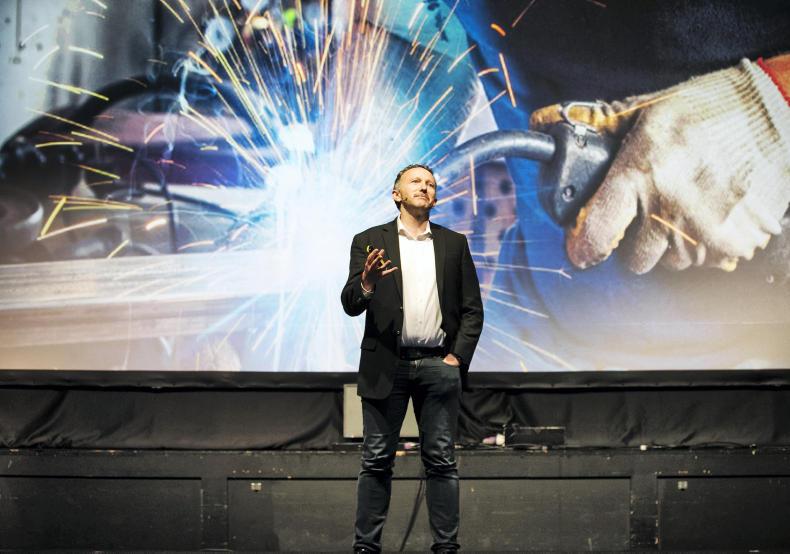
Norman Crowley, CEO of Crowley Carbon.
Interesting.
It’s incredible. A lot of what we do is migrate companies from Freon systems to natural cooling systems and then optimise those systems, whether that’s meat factories in the US or monster district cooling plants in the Middle East. We would go into a cold store business and comfortably reduce their energy consumption by 40%.
I imagine heat is also a big reason for energy waste?
It is. Large-scale cooking or heating systems are also incredibly wasteful. So in the food sector we work with companies such as Bunge (one of the biggest vegetable oil and soy producers in the world) and their competitors such as Cargill. Those companies are monsters and they have enormous energy consumption. But margins are still quite tight in those businesses so they’re very glad to see us coming in the door to reduce their energy costs by one-third.
And then we work with Big Meat; so all the big meat companies such as Tyson Foods, BRF Brazil, JBS and others. To give you an idea of how we work with a customer like that we’d be aiming to save them €200m a year in energy costs.
How did you get clients like those?
We just knocked on their door. The same way Kerry Group did it all those years back.
Do you have any Irish customers?
We do. The meat companies here are clients of ours such as Dawn Meats and Larry Goodman’s ABP. We’re working with them all the time as there’s still plenty of money they can be saving every day in their meat factories. Hilton Meats would be our most efficient meat client by far. They’re an amazing company. They’ve excellent engineers who are awake all the time and we have a real partnership with them. Other meat factories wouldn’t be half as efficient as Hilton. They’re very clever and understand what they want.
Irish dairy could be more efficient as well. Some of the major co-ops are clients of ours. Glanbia is a client but there’s still plenty of opportunity to save energy there.

Norman Crowley, CEO of Crowley Carbon.
Do you carry out once-off projects with companies or are you constantly working with them?
One of the problems with maintaining optimal energy efficiency is that processing plants are changing and operating differently all the time. If you save money today, you will probably lose that money tomorrow.
How do you mean?
To take it back to a farm example – we would take a bulk tank system and save the farmer 30%. But you’ve a condenser on the outside of the bulk tank. If that gets blocked, you’ve lost that 30% saving and it makes the system inefficient again. So we’ve developed our own software that tells us about daily changes in operational efficiency. We create a “smart factory” using this sensor technology.
[Norman hands me one of the sensors].
So that sensor detects pressure changes within pipes in a factory. That allows us to tell if something is blocked or not running optimally and then we can fix it. We have about 50 different types of those sensors developed. This technology is extremely cutting-edge. We developed this ourselves and nobody else has anything like it in the world. We can deploy 200 sensors in a day inside a factory. This is the internet of things right in front of you.
Traditionally, a sensor like that would cost €1,000 and take a day to install. I can install that in two or three minutes and you can have it for €2 or €3 per week.
So you don’t actually sell the sensor to the client?
No. We lease them to clients. We have sensors for pressure, temperature, vibration… you name it. And that’s part of our “smart factory” approach. Data makes a factory smart but then you need the software to automatically look at that data and recognise when temperature or pressure or whatever is not right. These sensors provide us with an entire picture of how the factory is running. And the money that saves. It’s not just energy cost. It’s throughput and quality too.
How so?
There’s a pet food plant here in Ireland and we were able to increase the plant’s throughput by 7% just by monitoring its chilled water temperature. That allowed it to cook a lot more batches of pet food every day because we were able to give it chilled water a lot faster. And it wasn’t by replacing the technology they had installed. It was just by optimising it. We do a lot of that kind of optimisation.
Farmers can grow the ingredients needed to make these [meatless] products
Let’s talk about farming. What are your views on Irish agriculture?
I grew up on a farm. I ran our farm at home for two years after I left school and I can tell you there’s a lot of work in 120 cows. My sense of Irish farming is that the Government has really let down the small Irish farmer. The CAP is just about keeping some farmers alive but the suckler beef farmer is not making any money and the Government really hasn’t done anything to fix that in 20 years. The sector is just dying off. For example, my brother’s kid isn’t going to go into beef farming. We did a climate event in Clonakilty before Christmas and I met a good few farmers at it and none of their kids were going into farming.
It will be fascinating to see how climate policy shapes our agriculture sector over the coming years. I think you will see the EU starting to pay farmers to capture carbon from the atmosphere.
I think you’re right. I enjoy arguing with farmers who think farming will stay the same as it is right now because all the numbers are against them. You have to change and if you don’t change you’ll be left behind.
Some farmers don’t get climate change but most of them do. A lot of farmers are out in the weather and they can see it with their own eyes. I’ve talked to farmers who say they can sense the change in climate. It probably scares farmers more than most people. The dry summer we had two years ago scared the shit out of me.
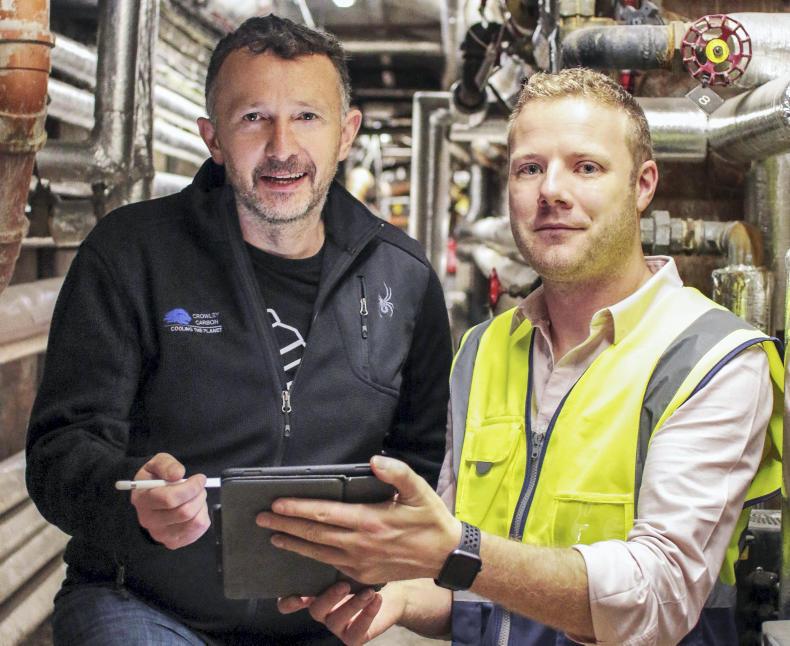
Norman Crowley, CEO of Crowley Carbon, and Gerard De Brun from Real Safe Always.
Outside of Brexit, climate change and sustainability are without a doubt the dominant issues in Irish agriculture.
Really? That’s fascinating. I’m actually delighted to hear that. The media wouldn’t reflect that.
That’s because the mainstream media generally only cover negative stories about farming.
Like the impact of dairy expansion on the environment?
Yes. But the expansion in Irish dairy is now slowing.
It’s fascinating that you think the expansion is slowing. There’s a farmer leasing some of my brother’s farm and he has 500 cows. He just keeps growing and growing and growing, and has no plans to stop. How are those farmers going to slow down?
Farmers are being given signals to slow down. Environmental regulations on things such as water quality and nitrates levels are already putting the brakes on further expansion. We don’t want to repeat the mistakes in places like New Zealand. There’s a natural balance in production to be found and we have our image to protect.
It’s milk quotas all over again! That’s interesting. I hadn’t realised that.
Ireland will always be a good place to produce meat and dairy. If meat and dairy production isn’t sustainable in Ireland then there’s nowhere in the world it can be.
I agree with you that Ireland has a place to produce high-end meat. I’m not a vegan or a vegetarian. I eat meat, although I don’t eat a lot of meat because I understand the problems it causes. And I don’t eat steak at all. Ever.
Why not?
If you put on your engineer’s hat, the cow is a 2% converter of food to food. And that’s not a sustainable business. The reason meat production is challenged is that if everybody in the world started eating meat like we do in Europe, we would need seven planet earths to feed everyone.
In what direction would you like to see Irish farming heading?
We should focus on growing things like hemp and more trees. All the weird things. How about a farm with cattle or sheep, a load of trees and a load of solar panels? Crowley Carbon would like to get involved in something like that. I know farmers love sitting in the pub and chatting about cattle but those days are gone. Farming needs to change.
Are you saying you’re getting involved in the farming sector?
Believe it or not, we’re actually at the early stages of putting something together that will help Irish farmers fund energy-efficiency investments or start generating renewable energy on their own farm. Solar is going to be big on farms and wind farming will also be huge in the future.
We’re aiming to work with farming partners by 2021 to do a big project on energy efficiencies. So that’s milking and lighting, as well as solar batteries. The aim will be to put together a package, which we definitely can do. We can get the investment. It’s more who can service the farmer because they’re too small for us to call to. We’ve identified some partners already to help us.
I also think Irish farmers need to embrace meatless food products, as much of a contradiction as that is for most farmers.
But what role is there for farmers in producing meatless products?
Farmers can grow the ingredients needed to make these products. But they need to set up new co-ops to take their share from the market. Back in the 1930s, farmers got around the problem of being bullied by London by setting up their own co-ops to get a fair price for their produce. So why don’t farmers set up a co-op today to make meatless products?
If you want to get farmers into meatless products you don’t get them growing the plant ingredients. You need to get them directly to the end market.
Norman Crowley is one of the more interesting characters you will come across in Irish business. A native of Clonakilty in Co Cork, Crowley undoubtedly sees himself as a force for change. He’s strongwilled, deeply passionate about effective climate action, has little time for “Green socialism” and he approaches everything with a “just get it done” attitude.
The son of a farmer, Crowley describes himself as a “serial entrepreneur” having started, developed and sold businesses all throughout his career. These include a gaming software business, which he sold for €500m in 2008 and a computer business, which he sold in 1999 just before the bursting of the dot-com bubble.
But for the last decade, Crowley has dedicated his energy to meeting the climate challenge head on and plans to make a lot of money while doing it.
In 2010, he founded the company Crowley Carbon, which helps businesses to slash their carbon footprint by improving the energy efficiency of large processing plants, supply chains and offices. The company is growing rapidly. Turnover in the business is doubling every year and will reach €100m for 2020. In 2021, Crowley is forecasting that his business will achieve €200m in turnover. It’s a bit of a monster, as he says himself.

One of the sensors developed by Crowley Carbon.
When I first heard Norman Crowley interviewed on the radio, I was immediately drawn to his passion for climate action even though I didn’t necessarily agree with all of his views, particularly when it comes to agriculture.
When I subsequently reached out to him for an interview Crowley said he was “intrigued” that the Irish Farmers Journal would be interested in speaking to him, especially since he recently established his own plant-based meat company and is quite vocal on the inefficiency of beef production.
Nonetheless, he agreed to sit down for a chat. On a bright day in February this year, I found myself overlooking the well-manicured gardens of Powerscourt Estate from the third floor of the stately Powerscourt House in Enniskerry, Co Wicklow, which also serves as the home offices of Crowley Carbon.
Lorcan Allen: What’s your view on sustainability?
Norman Crowley: I feel that the term “sustainable” is always associated with the lesser or the least worst option. The Green lobby has done itself no favours in how it’s approached the climate change issue by essentially just offering consumers two choices. Either live minimally without the trappings of modern life such as foreign travel and eating meat, or else you can live to the max and damage the planet. And consumers may feel guilty about damaging the planet but they will always choose progress and to live to the max when those are their options. It’s like telling people they have to eat a veggie burger even though they’d much rather have a steak. They won’t do it.
That’s an interesting view. Does the Green lobby think its approach has been a mistake?
For me, the big problem with sustainability is there are always overtones of socialism about it. The Green lobby doesn’t think anyone should be profitable from sustainability. Heaven forbid anyone could be sustainable and wealthy! Our tagline is “Life Unlimited”, yet the amount of climate activists who come to us and say that life can’t be unlimited if it’s sustainable. Why the f**k not? I want to live my life to the max but I can also be sustainable.
I’ve never heard that view before. So tell me about your business and what you do to solve climate change?
Our overall organisation is what’s known as Cool Planet Group. We’re a weird bunch because Cool Planet is a mix of for profit businesses along with a non-profit foundation that just tries to do good basically. So we break our approach into three areas: impact, educate and inspire.
The “impact” side of our business is Crowley Carbon and a bunch of other businesses that aim to suck carbon out of the air as fast as humanly possible.
The “educate” side of our business is basically a foundation called Cool Planet Experience, which is an interactive experience here in Powerscourt designed to educate people about climate change. Since we opened it, there’s been 30,000 people through the doors.
A lot of what we do is migrate companies from Freon systems to natural cooling systems and then optimise those systems
And the “inspire” side of the Cool Planet Group are a number of businesses that are designed to shake up the system. So our first “inspire” business is called Electrifi, where we convert old classic cars to electric engines. Most of these cars we’re converting wouldn’t have a price tag of less than €1m. We’re currently converting the cars at a plant in Wales but, by Christmas 2020, we hope to be converting classic cars to electric here in Powerscourt.
Let’s start with Crowley Carbon. Tell me about that business.
Well, as I said, we want to suck as much carbon out of the air as possible. And the fastest way you can suck carbon out of the air is with efficiency. The reason for that is because humans waste 50% of the energy we consume. That’s just life. So our job is to stop that 50% energy waste. And to have the biggest impact we go directly to the biggest users of energy.
So your target market isn’t working with small SME-type businesses?
No, not at all. We’re aiming to work with large-scale manufacturing business such as Glanbia here in Ireland, but even bigger. Four of the eight largest food companies in the world are clients of ours. In pharma, eight of the top 10 companies are clients while in the technology sector five of the top 10 companies are clients of ours. When we started off first, we were working with local SuperValu stores in Ireland where the average energy bill would be €60,000 per year.
Today, if your company’s energy bill isn’t €10m a year, then you probably don’t know what Crowley Carbon is. And the reason for that is because we can save one-third of your energy costs. So if you have a €10m energy bill, then we can save you €3m. And now we’re operating at an even bigger level. The biggest client we work with has a €3.4bn energy spend every year. So our target is to reduce that spend by €1bn annually. It would take us about five years to do that because we have to carry out projects at every factory owned by the company, which is time-consuming.
The biggest client we work with has a €3.4bn energy spend every year
So how do you achieve that?
Well, it’s very similar to a dairy farm actually. The biggest energy user on the farm is the refrigeration of the bulk tanks. So we would optimise that and take one-third of the energy consumption off it. How we do that is because refrigeration globally is not efficient.
Really?
Yes. Refrigerators do all the wrong things at all the wrong times. We improve this by either replacing the refrigeration technology or improving it. For instance, if you have a bulk tank on your farm it’s likely using a Freon system, also known as F gas. We would replace that system with a C02 cooling system, which will halve the energy cost. C02 is a natural refrigerant so it’s not damaging the environment.
Every meat factory in the world has a really inefficient cooling system and the biggest energy user in a meat factory is its refrigeration system. Over 50% of energy usage in a meat factory is cooling. Normally, at least half of that energy is wasted.
I didn’t realise that. Why is refrigeration technology so inefficient?
Because you have large refrigeration companies that are lobbying governments all over the world to prevent a move towards natural refrigerants such as C02 or ammonia, which are the main two natural gases for refrigeration. Have you ever seen the “drawdown” list?
No.
It’s a list of the top 100 things that we can do to stop climate change. The drawdown list is all about the top five solutions. What would you say is number one on that list of things we can do to stop climate change?
I’d imagine it’s something to do with cutting our reliance on fossil fuels.
It’s actually not. The number one is refrigerant gases, or F gases. They are biggest global problem for climate change.
I never knew that.
Most people don’t. The reason we don’t wake up and worry about this more is because large refrigeration companies don’t want people to know about it.
And why would those companies not transition to natural refrigerants?
Because it would cost them billions. It’s much easier to lobby governments every year. People say the oil companies are the ones holding back any meaningful action on climate change. It’s actually those refrigeration companies that are the biggest block.

Norman Crowley, CEO of Crowley Carbon.
Interesting.
It’s incredible. A lot of what we do is migrate companies from Freon systems to natural cooling systems and then optimise those systems, whether that’s meat factories in the US or monster district cooling plants in the Middle East. We would go into a cold store business and comfortably reduce their energy consumption by 40%.
I imagine heat is also a big reason for energy waste?
It is. Large-scale cooking or heating systems are also incredibly wasteful. So in the food sector we work with companies such as Bunge (one of the biggest vegetable oil and soy producers in the world) and their competitors such as Cargill. Those companies are monsters and they have enormous energy consumption. But margins are still quite tight in those businesses so they’re very glad to see us coming in the door to reduce their energy costs by one-third.
And then we work with Big Meat; so all the big meat companies such as Tyson Foods, BRF Brazil, JBS and others. To give you an idea of how we work with a customer like that we’d be aiming to save them €200m a year in energy costs.
How did you get clients like those?
We just knocked on their door. The same way Kerry Group did it all those years back.
Do you have any Irish customers?
We do. The meat companies here are clients of ours such as Dawn Meats and Larry Goodman’s ABP. We’re working with them all the time as there’s still plenty of money they can be saving every day in their meat factories. Hilton Meats would be our most efficient meat client by far. They’re an amazing company. They’ve excellent engineers who are awake all the time and we have a real partnership with them. Other meat factories wouldn’t be half as efficient as Hilton. They’re very clever and understand what they want.
Irish dairy could be more efficient as well. Some of the major co-ops are clients of ours. Glanbia is a client but there’s still plenty of opportunity to save energy there.

Norman Crowley, CEO of Crowley Carbon.
Do you carry out once-off projects with companies or are you constantly working with them?
One of the problems with maintaining optimal energy efficiency is that processing plants are changing and operating differently all the time. If you save money today, you will probably lose that money tomorrow.
How do you mean?
To take it back to a farm example – we would take a bulk tank system and save the farmer 30%. But you’ve a condenser on the outside of the bulk tank. If that gets blocked, you’ve lost that 30% saving and it makes the system inefficient again. So we’ve developed our own software that tells us about daily changes in operational efficiency. We create a “smart factory” using this sensor technology.
[Norman hands me one of the sensors].
So that sensor detects pressure changes within pipes in a factory. That allows us to tell if something is blocked or not running optimally and then we can fix it. We have about 50 different types of those sensors developed. This technology is extremely cutting-edge. We developed this ourselves and nobody else has anything like it in the world. We can deploy 200 sensors in a day inside a factory. This is the internet of things right in front of you.
Traditionally, a sensor like that would cost €1,000 and take a day to install. I can install that in two or three minutes and you can have it for €2 or €3 per week.
So you don’t actually sell the sensor to the client?
No. We lease them to clients. We have sensors for pressure, temperature, vibration… you name it. And that’s part of our “smart factory” approach. Data makes a factory smart but then you need the software to automatically look at that data and recognise when temperature or pressure or whatever is not right. These sensors provide us with an entire picture of how the factory is running. And the money that saves. It’s not just energy cost. It’s throughput and quality too.
How so?
There’s a pet food plant here in Ireland and we were able to increase the plant’s throughput by 7% just by monitoring its chilled water temperature. That allowed it to cook a lot more batches of pet food every day because we were able to give it chilled water a lot faster. And it wasn’t by replacing the technology they had installed. It was just by optimising it. We do a lot of that kind of optimisation.
Farmers can grow the ingredients needed to make these [meatless] products
Let’s talk about farming. What are your views on Irish agriculture?
I grew up on a farm. I ran our farm at home for two years after I left school and I can tell you there’s a lot of work in 120 cows. My sense of Irish farming is that the Government has really let down the small Irish farmer. The CAP is just about keeping some farmers alive but the suckler beef farmer is not making any money and the Government really hasn’t done anything to fix that in 20 years. The sector is just dying off. For example, my brother’s kid isn’t going to go into beef farming. We did a climate event in Clonakilty before Christmas and I met a good few farmers at it and none of their kids were going into farming.
It will be fascinating to see how climate policy shapes our agriculture sector over the coming years. I think you will see the EU starting to pay farmers to capture carbon from the atmosphere.
I think you’re right. I enjoy arguing with farmers who think farming will stay the same as it is right now because all the numbers are against them. You have to change and if you don’t change you’ll be left behind.
Some farmers don’t get climate change but most of them do. A lot of farmers are out in the weather and they can see it with their own eyes. I’ve talked to farmers who say they can sense the change in climate. It probably scares farmers more than most people. The dry summer we had two years ago scared the shit out of me.

Norman Crowley, CEO of Crowley Carbon, and Gerard De Brun from Real Safe Always.
Outside of Brexit, climate change and sustainability are without a doubt the dominant issues in Irish agriculture.
Really? That’s fascinating. I’m actually delighted to hear that. The media wouldn’t reflect that.
That’s because the mainstream media generally only cover negative stories about farming.
Like the impact of dairy expansion on the environment?
Yes. But the expansion in Irish dairy is now slowing.
It’s fascinating that you think the expansion is slowing. There’s a farmer leasing some of my brother’s farm and he has 500 cows. He just keeps growing and growing and growing, and has no plans to stop. How are those farmers going to slow down?
Farmers are being given signals to slow down. Environmental regulations on things such as water quality and nitrates levels are already putting the brakes on further expansion. We don’t want to repeat the mistakes in places like New Zealand. There’s a natural balance in production to be found and we have our image to protect.
It’s milk quotas all over again! That’s interesting. I hadn’t realised that.
Ireland will always be a good place to produce meat and dairy. If meat and dairy production isn’t sustainable in Ireland then there’s nowhere in the world it can be.
I agree with you that Ireland has a place to produce high-end meat. I’m not a vegan or a vegetarian. I eat meat, although I don’t eat a lot of meat because I understand the problems it causes. And I don’t eat steak at all. Ever.
Why not?
If you put on your engineer’s hat, the cow is a 2% converter of food to food. And that’s not a sustainable business. The reason meat production is challenged is that if everybody in the world started eating meat like we do in Europe, we would need seven planet earths to feed everyone.
In what direction would you like to see Irish farming heading?
We should focus on growing things like hemp and more trees. All the weird things. How about a farm with cattle or sheep, a load of trees and a load of solar panels? Crowley Carbon would like to get involved in something like that. I know farmers love sitting in the pub and chatting about cattle but those days are gone. Farming needs to change.
Are you saying you’re getting involved in the farming sector?
Believe it or not, we’re actually at the early stages of putting something together that will help Irish farmers fund energy-efficiency investments or start generating renewable energy on their own farm. Solar is going to be big on farms and wind farming will also be huge in the future.
We’re aiming to work with farming partners by 2021 to do a big project on energy efficiencies. So that’s milking and lighting, as well as solar batteries. The aim will be to put together a package, which we definitely can do. We can get the investment. It’s more who can service the farmer because they’re too small for us to call to. We’ve identified some partners already to help us.
I also think Irish farmers need to embrace meatless food products, as much of a contradiction as that is for most farmers.
But what role is there for farmers in producing meatless products?
Farmers can grow the ingredients needed to make these products. But they need to set up new co-ops to take their share from the market. Back in the 1930s, farmers got around the problem of being bullied by London by setting up their own co-ops to get a fair price for their produce. So why don’t farmers set up a co-op today to make meatless products?
If you want to get farmers into meatless products you don’t get them growing the plant ingredients. You need to get them directly to the end market.













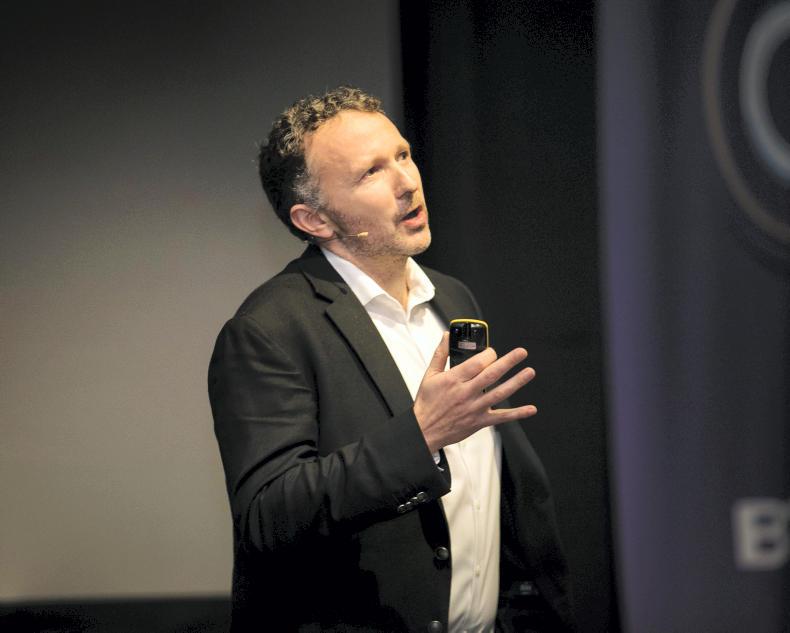
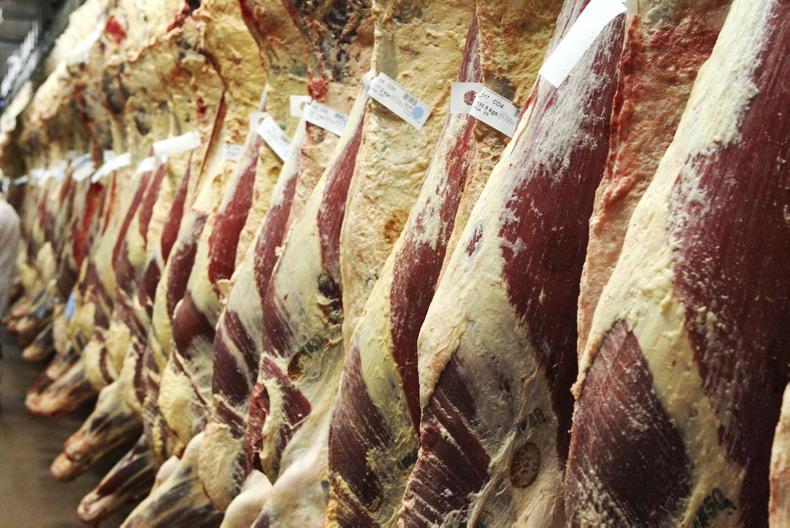

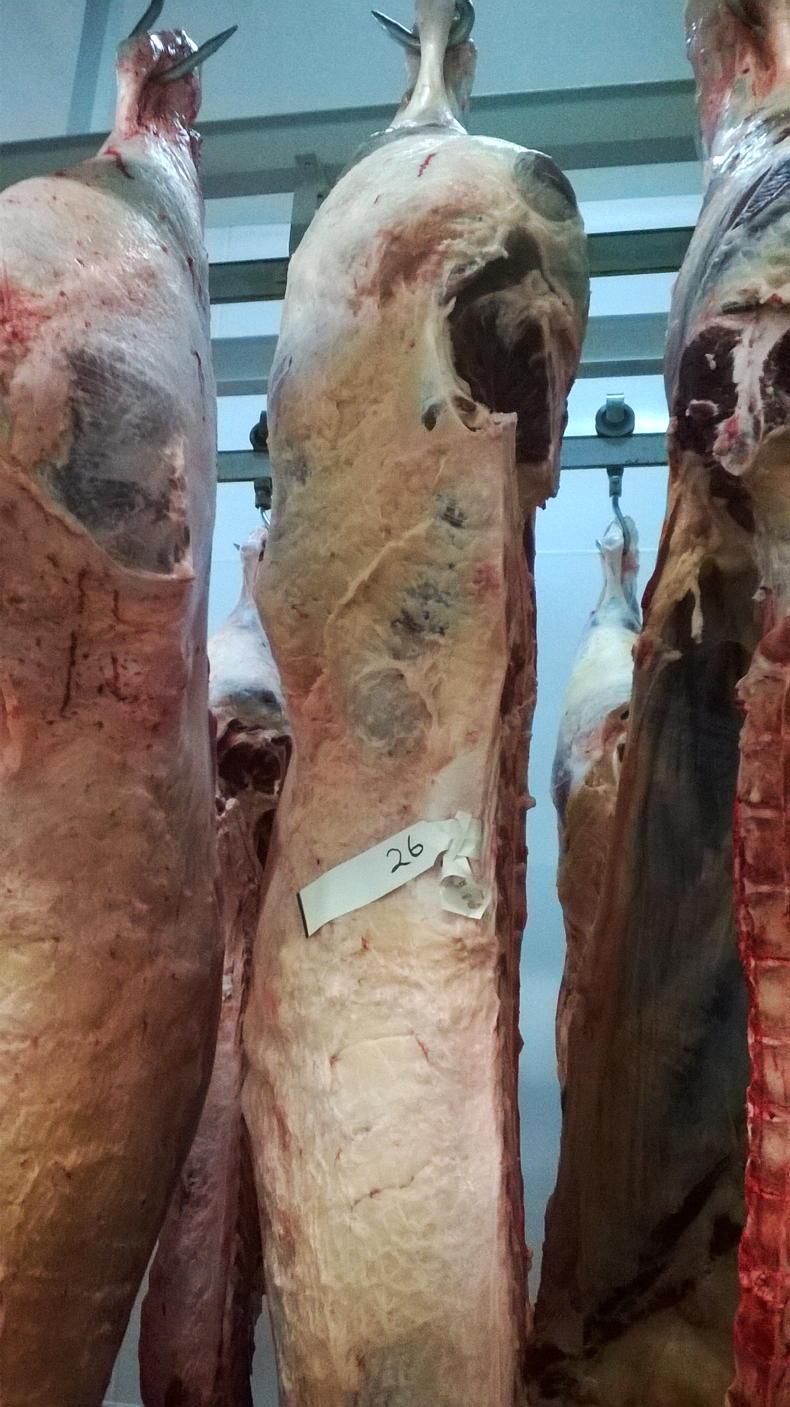
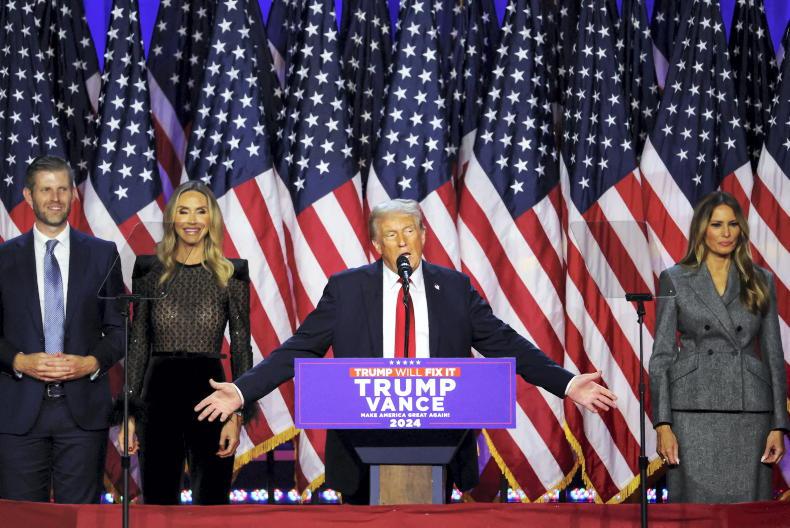
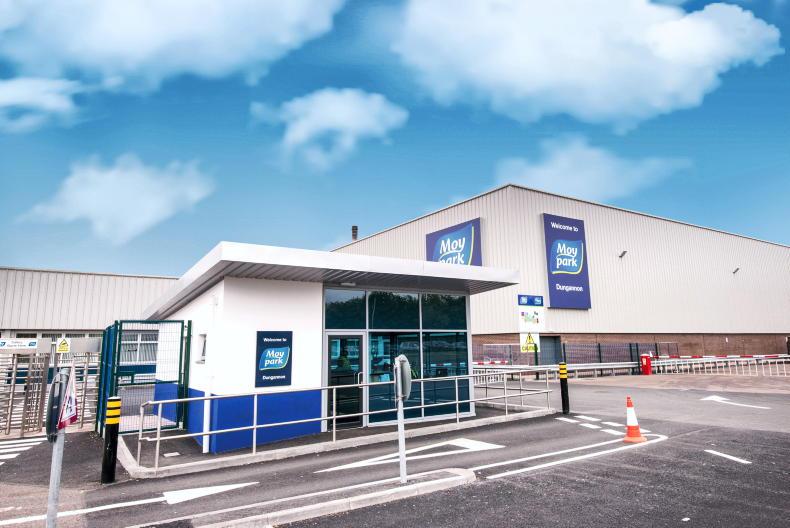
SHARING OPTIONS